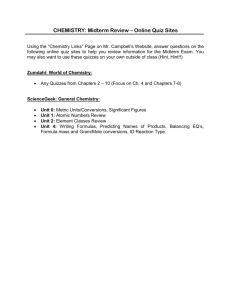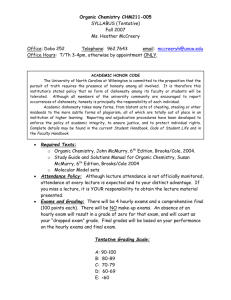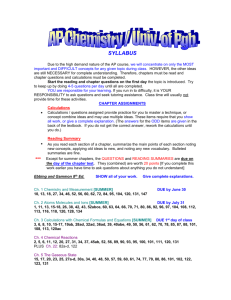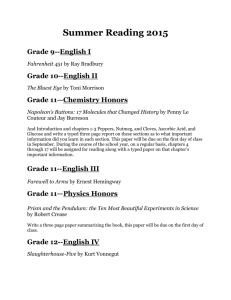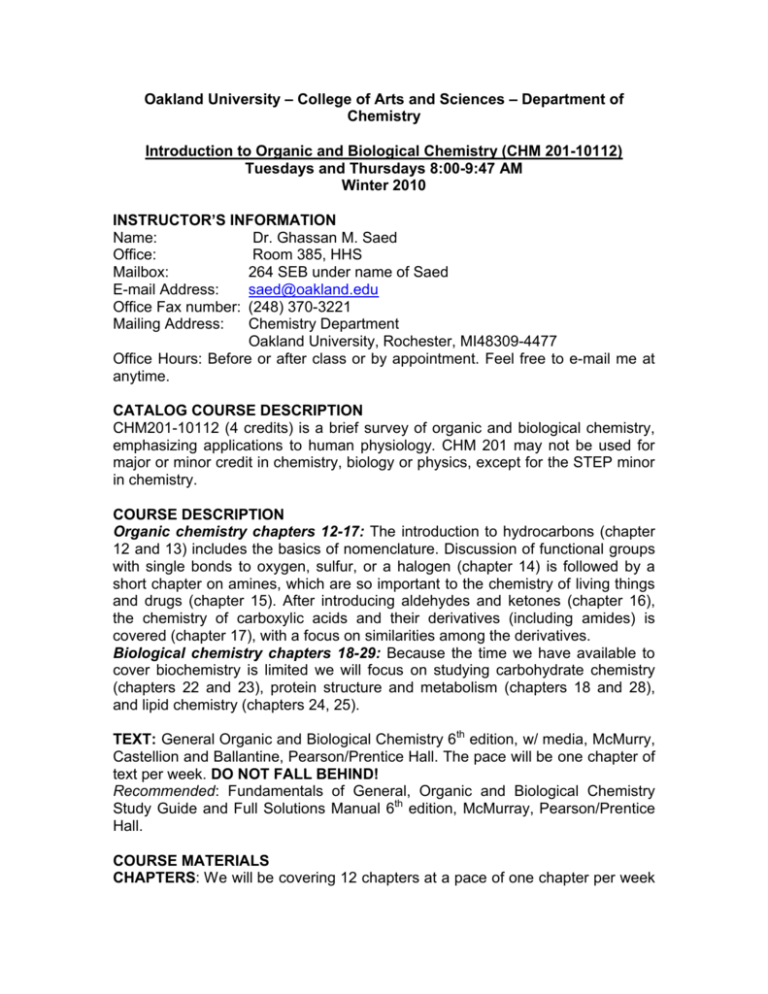
Oakland University – College of Arts and Sciences – Department of
Chemistry
Introduction to Organic and Biological Chemistry (CHM 201-10112)
Tuesdays and Thursdays 8:00-9:47 AM
Winter 2010
INSTRUCTOR’S INFORMATION
Name:
Dr. Ghassan M. Saed
Office:
Room 385, HHS
Mailbox:
264 SEB under name of Saed
E-mail Address:
saed@oakland.edu
Office Fax number: (248) 370-3221
Mailing Address:
Chemistry Department
Oakland University, Rochester, MI48309-4477
Office Hours: Before or after class or by appointment. Feel free to e-mail me at
anytime.
CATALOG COURSE DESCRIPTION
CHM201-10112 (4 credits) is a brief survey of organic and biological chemistry,
emphasizing applications to human physiology. CHM 201 may not be used for
major or minor credit in chemistry, biology or physics, except for the STEP minor
in chemistry.
COURSE DESCRIPTION
Organic chemistry chapters 12-17: The introduction to hydrocarbons (chapter
12 and 13) includes the basics of nomenclature. Discussion of functional groups
with single bonds to oxygen, sulfur, or a halogen (chapter 14) is followed by a
short chapter on amines, which are so important to the chemistry of living things
and drugs (chapter 15). After introducing aldehydes and ketones (chapter 16),
the chemistry of carboxylic acids and their derivatives (including amides) is
covered (chapter 17), with a focus on similarities among the derivatives.
Biological chemistry chapters 18-29: Because the time we have available to
cover biochemistry is limited we will focus on studying carbohydrate chemistry
(chapters 22 and 23), protein structure and metabolism (chapters 18 and 28),
and lipid chemistry (chapters 24, 25).
TEXT: General Organic and Biological Chemistry 6th edition, w/ media, McMurry,
Castellion and Ballantine, Pearson/Prentice Hall. The pace will be one chapter of
text per week. DO NOT FALL BEHIND!
Recommended: Fundamentals of General, Organic and Biological Chemistry
Study Guide and Full Solutions Manual 6th edition, McMurray, Pearson/Prentice
Hall.
COURSE MATERIALS
CHAPTERS: We will be covering 12 chapters at a pace of one chapter per week
in the following order: Chapter 12 (Alkanes), chapter 13 (Alkenes, Alkynes, and
Aromatic Compounds), chapter 14 (Alcohols, Phenols, Ethers, and Thiols),
chapter 15 (Amines), chapter 16 (Aldehyde and Ketones), chapter 17 (Carboxylic
Acids and Their Derivatives), chapter 18 (Amino Acids and Proteins), chapter 22
(Carbohydrates), chapter 24 (Lipids), chapter 23 (Carbohydrate Metabolism),
chapter 25 (Lipid Metabolism), and chapter 28 (Protein Metabolism).
QUIZZES: Twelve quizzes will be given throughout the course. Each quiz is
worth 5 points. Please refer to Mastering Chemistry for the quiz assignments
and their due dates.
HOMEWORK: Twelve homework assignments will be given throughout the
course. Each homework is worth 5 points. Please refer to Mastering Chemistry
for the homework assignments and their due dates.
STYLE OF COURSE: Given the size of the class, lecturing will predominate. I
won’t lecture about everything in the text. Rather, lectures will focus on the main
themes of each chapter. Nevertheless, you are responsible for everything in the
lectures and in the text (except for a few exclusions that will be listed as I go
along). Power point slides for all lectures are also available via Mastering
Chemistry website, under student resources. It is your choice not to attend
classes but you are responsible for all the materials discussed during classes.
DISSCUSSION BOARD: The discussion board on Moodle is specifically
designated to discuss any topic related to this class. I will closely monitor
everything posted. I also encourage all of you to answer questions and concerns
of the others, if you know the answer. If you need to discuss any private matter
and do not wish to share it with your classmates please use the email specifically
designated for this class on Moodle. Please do not use my saed@oakland.edu
email. I will not answer it.
EXAMS AND GRADING
Grades are based on scores collected from all exams, quizzes and homework
assignments. Exam I will cover chapters 12, 13, and 14, exam II will cover
chapters 15, 16, and 17, exam III will cover chapters 18, 22, and 24, and
comprehensive final ACS exam will cover all chapters. Examinations are based
on material covered in the textbook. Exams will consist of multiple-choice
questions.
The graded work will be:
Exams
300 points (100 points/exam)
Final Exam
100 points
Homework assignments
60 points (5 points/HW)
Quiz assignments
60 points (5 points/quiz)
The maximum number of points that any student can accumulate is 520 points.
Final numeric grades will be based on the highest score in the class, which will
be assigned a 4.0 grade. Grades will be calculated using the following formula:
student’s total points divided by the highest number of points earned out of the
whole class multiplied by 4. Obviously, the highest number of points cannot be
determined until the end of the semester. To monitor your progress in the class,
please use the highest number of points possible for each exam.
Scantron forms F-1712-PAR-L are required for all exams. Scantron forms are
available at the Book Store (Student Congress may offer them for free). Bring
one and a pencil each EXAM. The grading machine is very accurate, but you
won’t receive credit in the case of your poor erasure; therefore, work out your
answers completely on the question sheet (which you may write on and keep),
and, only then, transfer them to the answer sheet.
The only electronic device allowed is a calculator. The only calculators allowed
are the TI-30X or TI-30X Solar scientific calculators. You may not have any
cellular phone, radio/MP3 player, or other electronic device on your person.
Please turn off cellular phone during exams. Once an exam begins, you will not
be allowed to leave the room and return to complete your exam.
No Make-up exams are given. Should you miss an exam for non-legitimate
reasons, you will receive a grade of zero on the missed examination. If you
missed an exam for a legitimate reason, we can negotiate. You will receive
ongoing grade feedback on Moodle; click on “Grades” in the left column. Grading
disagreements should be submitted in writing. I will make a decision, based on
the logic of your argument.
The University also asks us to record midterm grades on SAIL. They will be
available about March 1, using S/U grading. If your grade at that point is below
a 2.0, a U (Unsatisfactory) will be listed. If no grade is listed, assume an S
(Satisfactory) grade. Final course grades, however, will be numerical. The
Oakland grading system is: 3.6 to 4.0 = A, 3.0 to 3.5 = B, 2.0 to 2.9 = C, 1.0 to
1.9 =D, 0.0 = E.
ELECTRONIC AIDS: You must be able to access two different web sites.
Moodle: Our Moodle site is at: http://moodle.oakland.edu and there is no class
password; every class registrant is automatically in the system. Students have
course access to Moodle one week before the semester starts. Note: Using
Internet Explorer to access Moodle will generate errors. You must get the Firefox
browser from a free download at http://www.mozilla.com. You must check
Moodle for the latest news, announcements, class assignments, course syllabus,
and grades.
Mastering Chemistry: Mastering Chemistry will be used for homework and quiz
assignments. Click on Mastering Chemistry link on Moodle and register your self.
Instructions of how to register are posted on Moodle under Mastering Chemistry
login information.
SUGGESTIONS FOR STUDYING: Each semester some students come to me
puzzled as to why they are not doing well. There are two main reasons. One
group of students just isn't spending enough time studying. As a rule of thumb,
expect to spend six hours per week per credit. A second group of students is
putting in the time but still not getting the results. This results from following
teacher and text too mechanically. Look at the material from a fresh and deeper
perspective. You can’t succeed by sheer memorization; you must also
understand and be able to use the concepts.
ACADEMIC CONDUCT
Classroom Courtesy: The instructor of this course has a strong commitment to
the development and maintenance of an instructional climate that supports
respect for everyone in the classroom. Your enrollment in this course requires
that you will treat your fellow classmates and course instructor with respect.
The instructor reserves the right to adjust course grades for disrespectful
behavior.
Cheating: The University’s regulations that relate to academic misconduct will
be fully enforced. I insist on seeing your own work group’s work. Any student
suspected of cheating by copying on exams, changing answers on exams after
they are scored, obtaining exam questions prior to the exam time, use of any
previous student’s course work, plagiarism, giving or obtaining undeserved
points on group work, or by other means will be referred to the Academic
Conduct Committee. Students found guilty of academic misconduct face
suspension or permanent dismissal. Anyone found by the Academic Conduct
Committee to be guilty of misconduct will also receive a 0.0 grade for the
course from the instructor in addition to whatever sanction(s) the Committee
decides.
TIMETABLE
Date
Chapter
January 5, 7
Chapter 12 (Alkanes)
January 12, 14
Chapter 13 (Alkenes, Alkynes, and Aromatic Compounds)
January 19, 21, 26
Chapter 14 (Alcohols, Phenols, Ethers, and Thiols)
January 28
Exam I (Chapters 12-14, 100 points)
February 2, 4
Chapter 15 (Amines)
February 9, 11
Chapter 16 (Aldehyde and Ketones)
February 16, 18
Chapter 17 (Carboxylic Acids and Their Derivatives)
March 2
Exam II (Chapters 15-17, 100 points)
March 4, 9
Chapter 18 (Amino Acids and Proteins)
March 11, 16
Chapter 22 (Carbohydrates)
March 18, 23
Chapter 24 (Lipids)
March 2
Exam III (Chapters 18, 22, 24, 100 points)
March 30, April 1
Chapter 23 (Carbohydrate Metabolism)
April 6, 8
Chapter 25 (Lipid Metabolism)
April 13, 15
Chapter 28 (Protein Metabolism)
April 27
Final Exam
Final ACS comprehensive exam will be held in HHS190 from 8:00 -11:00 AM.


